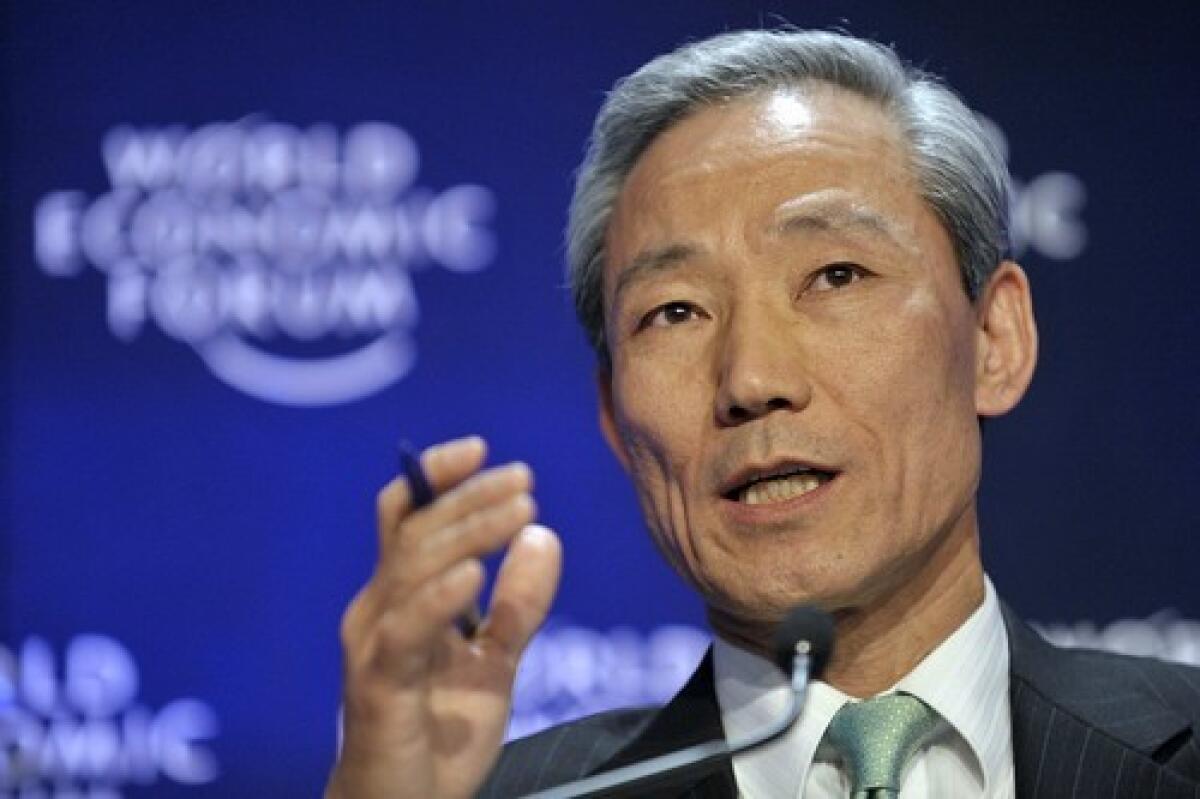South Korea stands behind U.S. free-trade pact

- Share via
Reporting from Seoul — South Korea is close to finalizing what officials here call a hard-won free-trade agreement with the European Union that would do away with most tariffs on trade between the two entities.
Now Seoul is setting its sights on Washington, trying to rescue an agreement signed two years ago that is giving U.S. officials second thoughts.
The Obama administration is hesitant to seek congressional ratification of the agreement negotiated by the Bush administration. Officials say a key provision would be likely to foster a trade imbalance in favor of South Korean automakers.
Fresh from the Group of 20 summit in London, both the U.S. and South Korea have pledged to work harder to come to terms on a comprehensive pact that, in the U.S. at least, has been running out of gas.
South Korean Trade Minister Kim Jong-hoon in Seoul recently discussed what needs to be done to make both sides happy.
When Washington and Seoul signed the U.S.-Korea free-trade agreement in 2007, officials from both governments portrayed the deal as a breakthrough. Now it’s mired in discord. What happened?
Since formally signed in June 2007, it has been delayed in taking effect mainly due to important political events such as presidential elections and general elections in both countries. Now that we have new administrations in both countries . . . I am sure that officials will find a way to move it forward. The two presidents, when they met at the occasion of the London G-20 summit, confirmed their strong commitment to work together.
The free-trade pact has yet to be ratified by lawmakers in either country. That means everything is still on the table, doesn’t it?
Both sides signed the agreement two years ago in the belief that it reflects their interests in a balanced manner. Once an agreement is signed, that means [the] substance is done and political judgment [is] to be passed through the procedure of ratification. Therefore, I don’t agree to the view that everything is still on the table. If everything were to be fluid and uncertain even after signing, the international community would have a great deal of difficulty in finding the common good.
Ronald Kirk, the new U.S. trade representative, has said the agreement “just simply isn’t fair.” Obama has called the deal “badly flawed.” If the U.S. backs off, what would be South Korea’s next move?
Considering the economic and strategic importance . . . I hope that the new U.S. administration will seek the congressional approval of the agreement at an early date. I believe anyone who reads the text carefully would understand that the agreement is ambitious, comprehensive, well balanced and mutually beneficial.
The U.S. says the deal as written fails to address an imbalance between Korean automakers and the U.S. auto industry. They say it gives Korean auto companies guaranteed access to the U.S. market without assurances that American companies can break into the Korean market. Your response?
Nothing can be guaranteed in a market but a level playing competition. The [agreement] contains everything the U.S. asked for during the negotiations; immediate elimination of Korea’s current 8% tariff on autos, flatten the consumption tax to 5% within three years [no differentiation by engine size]. . . . and lenient exceptions for U.S.-made cars in environmental and safety standards. The [U.S. International Trade Commission] report estimated that the agreement would provide a good base to substantially improve U.S. auto companies’ access to the Korean market.
According to statistics from the Korea Importers and Distribution Assn., Korean automakers sold seven times as many cars in the U.S. as American automakers sold in Korea. Is this parity?
Both Korean and American automakers sell cars by exporting and by producing at local subsidiaries. The number of cars sold in such manner in 2008 is: Korea sold in the U.S. 636,960 cars, while the U.S. sold in Korea 109,940 cars. Considering the size of the U.S. auto market, which is 14 times larger than that of Korea, a less than 7 to 1 ratio should not be regarded as unfair.
What’s your response to the Obama administration’s “Buy American” campaign?
It would be disastrous if countries of the world adopt a policy of “Buy national products.” Robust trade will help us to get through the current global economic downturn.
More to Read
Sign up for Essential California
The most important California stories and recommendations in your inbox every morning.
You may occasionally receive promotional content from the Los Angeles Times.











